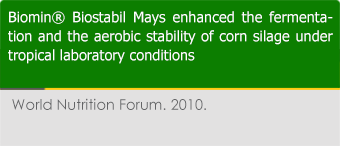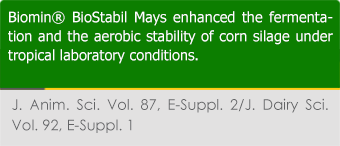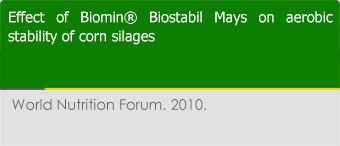Biomin BioStabil
 |
 |
|
|
A. A. Rodriguez,Y. Acosta Aragon, and E. Valencia An experiment was conducted to determine the effects of the silage additive Biomin® BioStabil Mays ( BSM, blend of homo- and heterofermentative lactic acid bacteria) on the fermentation characteristics and aerobic stability of corn whole plant (QPM variety) growth and ensiled in Puerto Rico. Corn was harvested 75 d after planting and chopped finely. Prior to ensiling, the vegetative material of the trial group was treated with BSM (1 x 105 cfu/g silage). A control group went untreated. Treatments were applied to weighted portions of corn forage , manually mixed, and packed into PVC laboratory silos. Samples of fresh forage of each treatment were taken at 0,3,45 and 90 d of fermentation ( triplicate silos of each treatment were available), analyzed for PH, chemical composition, and fermentation products. Statistical analysis was performed as a completely randomized design with a 2by 4 factorial arrangement of treatments. Tukey t-test was used for mean separation. For aerobic stability determination, triplicate silos from each treatment were emptied after 45 and 90 d of ensiling, placed into Styrofoam containers lined with a plastic bag and exposed to air for5 d. Temperature was monitored every 6 hours during the 5 d with a thermometer embedded in the surface of the exposed silage . the pH was measured after 0,1,3 and 5 d . statistical analysis of pH data was performed as a completely randomized design with a 2 by 5 factorial arrangement of treatments. The same model was utilized for temperature data except that 19 times of aerobic exposure (hours) were utilized instead of 5 d. Tukey t-test was used for mean comparison again. BSM enhanced the fermentation characteristics of corn ensiled during 45 d as evidenced by lower pH (p˂0.05) and higher lactic acid content (p˂0.05). after 90 d of fermentation BSM lowered the ratio of NH3-N/total-N(p˂0.05) as compared with corn ensiled without additive. After the opening of the silos at the d 45 and 90 the temperature of silages treated with BSM was lower than that of the control silage (p˂0.05) . in summary, BSM improved the fermentation characteristics and the aerobic stability of corn ensiled under tropical laboratory conditions.
|
A. A. Rodríguez*1, Y. Acosta-Aragón2, and E. Valencia1, 1University of Puerto Rico, Mayaguez, PR, 2Biomin GmbH, Austria. A. A. Rodríguez*1, Y. Acosta-Aragón2, and E. Valencia1, 1University of Puerto Rico, Mayaguez, PR, 2Biomin GmbH, Austria. An experiment was conducted to determine the effects of the silage additive Biomin® BioStabil Mays (BSM, blend of homo- and heterofermentative bacteria) on the fermentation characteristics and aerobic stability of corn whole plant (QPM variety) growth and ensiled in Puerto Rico. Corn was harvested 75 d after planting and chopped finely. Prior to ensiling, the vegetative material was treated or not with BSM (1 x 105 cfu/ g silage). Treatments were applied to weighted portions of corn forage, manually mixed, and packed into PVC laboratory silos. Samples of fresh forage and triplicates silos of each treatment were taken at 0, 3, 45 and 90 d of fermentation, analyzed for pH, chemical composition, and fermentation products. Statistical analysis was performed as a completely randomized design with a 2 by 4 factorial arrangement of treatments. Tukey t-test was used for mean separation. For aerobic stability determination, triplicate silos from each treatment were emptied after 45 and 90 d of ensiling, placed into styrofoam containers lined with a plastic bag and exposed to air for 5 d. Temperature was monitored every 6 hours during the 5 d with a thermometer embedded in the surface of the exposed silage. pH was measured after 0, 1, 3 and 5 d. Statistical analysis of pH data was performed as a completely randomized design with a 2 by 5 factorial arrangement of treatments. The same model was utilized for temperature data except that 19 times of aerobic exposure (hours) were utilized instead of 5 d. Tukey t-test was also used for mean comparison. BSM enhanced the fermentation characteristics of corn ensiled during 45 d as evidenced by lower pH (P<0.05) and higher lactic acid content (P<0.05). After 90 d of fermentation BSM lowered the ratio of NH3-N/total-N (P<0.05) as compared with corn ensiled without additive. After the opening of the silos at the d 45 and 90 the temperature of silages treated with BSM was lower than that of the control silage (P<0.05). In summary, BSM improved the fermentation characteristics and the aerobic stability of corn ensiled under tropical laboratory conditions.
|
 |
 |
|
|
K. Schondorfer, Y. Y. Acosta Aragon, A . Klimitsch, and G. Schatzmayr It is commonly know that corn silage ferments well due to the presence of fermentable sugars. However , in contrast to green forages, it is usually prone to aerobic deterioration due to a long growth period on the field and accordingly a high natural contamination with moulds and yeasts. Therefore it is crucial to improve the content of stabilizing acids (e.g. acetic acid, propionic acid) in a way that secures effective suppression of aerobic spoilage organisms upon opening the silo. This goal can be reached by directly adding stabilizing acids, which are usually expensive and/ or corrosive , or by producing them during the fermentation process, by addition of heterofermentative lactic acid bacteria . In the past numerous studies whit lactobacillus buchneri have shown a successful improvement of aerobic stability. Lactobacillus brevis, which is not less effective , has not yet come to its full recognition. The trials used in this study apply Biomin® BioStabil Mays consisting largely of L. brevis to whole crop maize and crushed maize grains to improve aerobic stability. |
 Biomin BioStabil
Biomin BioStabil